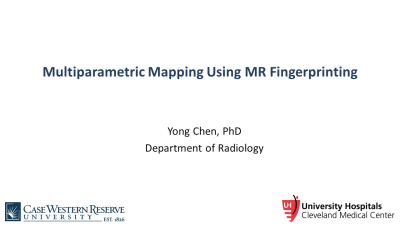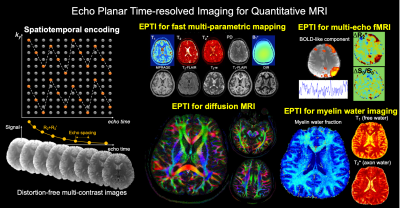Weekday Course
Novel Acquisition & Machine Learning Techniques for Quantitative MRI in Neuroimaging
ISMRM & ISMRT Annual Meeting & Exhibition • 03-08 June 2023 • Toronto, ON, Canada

| 15:45 |
Quantitative High-Gradient Diffusion MRI
Chantal Tax
Keywords: Contrast mechanisms: Diffusion Diffusion MRI sensitises the signal to the random motion of water molecules by applying diffusion encoding gradients. This talk will give a brief introduction on diffusion MRI and various quantitative measures that can be derived from diffusion MRI signal representations and biophysical models. Stronger gradients can yield shorter echo time, higher signal-to-noise ratio, and shorter diffusion times for a given b-value, and the benefits will be highlighted. Finally, the applications where strong gradients have shown benefits in fundamental and clinical research are explored. |
|
| 16:15 |
 |
Multiparametric Mapping Using MR Fingerprinting
Yong Chen
Keywords: Image acquisition: MR Fingerprinting, Image acquisition: Multiparametric, Neuro: Brain Magnetic Resonance Fingerprinting (MRF) is a novel imaging technique for rapid and simultaneous quantification of multiple tissue properties. This presentation will cover the basic concepts of Magnetic Resonance Fingerprinting from data acquisition to post-processing. Recent development in advanced reconstruction methods and its integration with machine learning for quantitative neuroimaging will be introduced. Finally, its application in clinical studies will be reviewed. |
| 16:45 |
 |
Quantitative Echo Planar Time-Resolved Imaging
Fuyixue Wang
Keywords: Image acquisition: Sequences, Image acquisition: Multiparametric, Contrast mechanisms: Diffusion EPTI is a novel distortion-free imaging technique that addresses the limitations of EPI while providing efficient multi-contrast imaging. EPTI recognizes the spatiotemporal data correlation during the image encoding process, and exploits it to replace conventional image formation and efficiently resolve the full spatiotemporal space. The high efficiency, improved image quality, and rich information of EPTI provide exciting opportunities for quantitative imaging. This talk will provide a comprehensive review of EPTI, its related technologies, and their applications in quantitative imaging. It will present EPTI’s concept, acquisition and reconstruction, followed by applications in multi-parametric mapping, diffusion MRI, myelin water, and functional imaging. |
| 17:15 |
Deep Learning-Powered Parameter Mapping
Jongho Lee
Keywords: Image acquisition: Multiparametric Deep Learning-Powered MRI Parameter Mapping uses deep neural networks to estimate T1 relaxation, T2 relaxation, diffusion, and susceptibility from MRI data. The network architecture typically includes perceptrons, 2D and 3D convolutional neural networks trained on large datasets. Generalization is a significant challenge, but data augmentation and network architecture modifications are being explored. Despite this, deep learning-powered MRI parameter mapping has the potential to revolutionize clinical MRI by enabling fast and accurate estimation of tissue parameters for diagnosis and treatment planning. |
The International Society for Magnetic Resonance in Medicine is accredited by the Accreditation Council for Continuing Medical Education to provide continuing medical education for physicians.